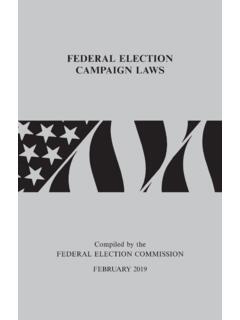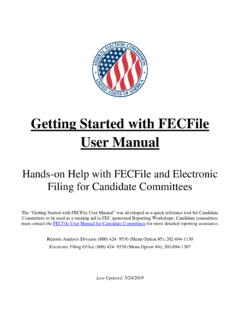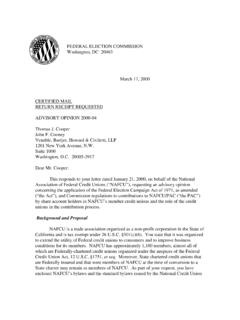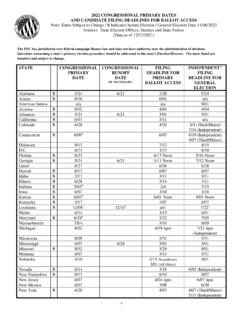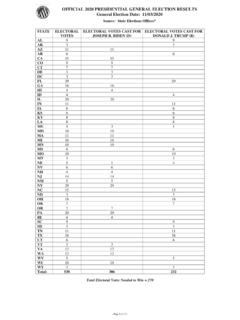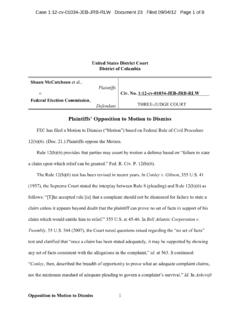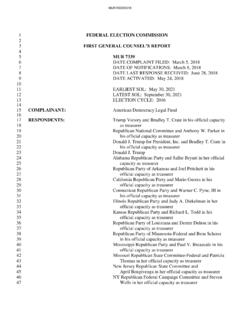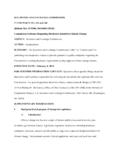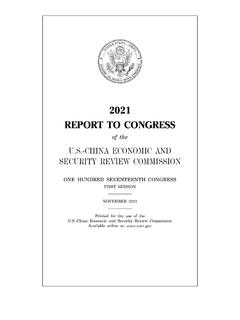Transcription of Campaign Guide for Congressional Candidates
1 Federal Election Commission U N I T E D S TAT E S o f A M E R I C A. Campaign Guide . Congressional Candidates and Committees October 2021. About this Guide This Campaign Guide for Congressional Candidates and Committees replaces the July 2014 edition. It summarizes the federal Campaign finance laws applicable to candidate committees as of September 2021. Federal Election Commission Washington, DC 20463. Commissioners: Shana M. Broussard, Chair Allen Dickerson, Vice Chair Sean J. Cooksey James E. Trey Trainor III. Steven T. Walther Ellen L. Weintraub Staff Director: Alec Palmer General Counsel (acting): Lisa J. Stevenson Prepared by the Information Division of the Office of Communications Director: Greg J. Scott Deputy Assistant Staff Director for Publications: George J.
2 Smaragdis Editor: Zainab S. Smith Layout and Design: James Landon Jones i Introduction This Guide was written to help House and Senate Candidates comply with the Federal Election Campaign Act and FEC regulations. It may be used by committees supporting Presidential Candidates who are not seeking public funding; however, special reporting rules apply to Presidential Candidates , as explained in footnotes to the reporting chapters. This publication provides guidance on certain aspects of federal Campaign finance law. It is not intended to replace the law or to change its meaning, nor does this publication create or confer any rights for or on any person or bind the Federal Election Commission (Commission) or the public. The reader is encouraged also to consult the Federal Election Campaign Act of 1971, as amended (52 30101 et seq.)
3 , Commission regulations (Title 11 of the Code of Federal Regulations), Commission advisory opinions and applicable court decisions. For further information, please contact: Federal Election Commission 1050 First Street, NE. Washington, DC 20463. 800/424-9530 (toll free). 202/694-1100 (local). 202/219-3336 (for the hearing impaired). (email). (website). ii Using this Guide Citations Authorities primarily cited in this Guide include the Federal Election Campaign Act, FEC regulations and FEC. Advisory Opinions (AOs). All regulatory citations are to Title 11 of the Code of Federal Regulations (CFR), Parts 100 116, 300, 400 and 9001 9039 (2020). Statutory citations are to Titles 26 and 52 of the United States Code ( ). Copies of AOs may be obtained from the FEC's Public Records Office (800/424-9530.)
4 Or 202/694-1120) or the FEC website. In addition, each AO is summarized in the Commission's online newsletter, the Record. Getting more help (Note that Congressional Campaign committees have to comply with other laws outside the FEC's jurisdiction; see Appendix G.). Advisory opinions Any person or group requiring a clarification of the election law with regard to an activity that they plan to undertake or are presently undertaking and intend to undertake in the future may request an advisory opinion from the FEC. Individuals and organizations involved in the activity specifically addressed in an AO. (or in an activity that is materially indistinguishable) may rely on the opinion. Advisory opinion requests may be addressed to the Office of General Counsel at: Federal Election Commission 1050 First Street, NE.
5 Washington, DC 20463. Consult the FEC's website for more information on how to request an AO. Toll-free line Many questions about federal Campaign finance law do not require formal advisory opinions. Such questions may be addressed to trained FEC staff members by calling the FEC's 800 number. Persons in the Washington, DC area may call locally. The numbers are: 800/424-9530. 202/694-1100. 202/219-3336 (for the hearing impaired). Hearing-impaired persons may reverse the charges when calling long distance. Questions may also be submitted by email to Free publications In addition to this Guide , the FEC publishes a series of brochures and other publications on several aspects of the Campaign finance and election laws. Email or call the FEC for a list of publications currently available, or visit the FEC website.
6 Iii Using this Guide Website Visit the FEC's home page at Information on the site includes Campaign finance statistical data; committee reports for Candidates , parties and PACs; FEC news releases; reporting dates; forms; the Record newsletter; brochures and Campaign guides. The FEC website also offers the capability to search the Commission's legal resources. Users can perform full text searches of Commission advisory opinions (AOs) (1977-present) using the name of a requestor or other keyword information. In addition, the FEC's Enforcement Query System allows users to search closed enforcement cases by such search criteria as respondent name or case number. SERS, the FEC's Searchable Electronic Rulemaking System, allows searches of completed and ongoing rulemakings, Commission regulations and Explanations and Justifications.
7 Users can also use SERS to submit comments to ongoing rulemakings. Compliance with Small Business Regulatory Enforcement Fairness Act of 1996. This Guide serves as the small entity compliance Guide for Congressional Candidates and committees, as required by Section 212 of the Small Business Regulatory Enforcement Fairness Act of 1996, Pub. L. No. 104- 121, Title II, Stat. 857 (1996). iv Contents CHAPTER 1. Testing the Waters 1. 1. Testing the Waters vs. Campaigning 1. 2. Contribution Limits and Prohibitions 2. 3. Recordkeeping and Accounting 2. 4. Organizing a Testing the Waters Committee 3. CHAPTER 2. Starting the Campaign 5. 1. Candidate Registration Threshold 5. 2. Candidate and Committee Registration 5. 3. Treasurer 6. 4. Statement of Candidacy: Line-by-Line Instructions 8.
8 5. Statement of Organization: Line-by-Line Instructions 8. 6. Filing Registration Forms 11. 7. Amendments 12. CHAPTER 3. Understanding Contributions 13. 1. What is a Contribution 13. 2. Types of Contributions 13. CHAPTER 4. Contribution Limits 17. 1. Overview of Limits 17. 2. How Limits Work 22. 3. Contributions to Unauthorized Committees 24. 4. Designated and Undesignated Contributions 24. 5. Date Contribution is Made vs. Date of Receipt 25. 6. Joint Contributions 26. 7. Remedying an Excessive Contribution 26. 8. Contributions to Retire Debts 30. 9. Candidate's Personal Funds 31. 10. Repayment of Personal Loans from Candidate 32. CHAPTER 5. Prohibited Contributions 33. 1. Prohibited Sources 33. 2. Questionable Contributions 36. CHAPTER 6. Other Reportable Receipts 39.
9 1. Bank Loans 39. 2. Brokerage Loans and Other Lines of Credit Obtained by Candidate 40. v Table of Contents 3. Overdrafts 40. 4. Investment Income 41. 5. Offsets to Operating Expenditures 41. 6. Legal and Accounting Services 41. CHAPTER 7. Sources of Support 43. 1. Contributions 43. 2. Free Legal and Accounting Services 43. 3. Volunteer Activity 43. 4. Travel Cost Exemptions 45. 5. Vendor Discounts 46. 6. Support from Other Campaigns 46. 7. Party Support 48. 8. Corporate/Labor Exceptions 50. 9. Use of Corporate/Labor Facilities and Resources 56. 10. Fundraisers for Candidates 57. 11. Independent Expenditures 58. 12. Electioneering Communications 59. CHAPTER 8. Expenditures and Other Uses of Campaign Funds 61. 1. Permissible Uses of Campaign Funds 61. 2. Prohibited Uses of Campaign Funds 63.
10 CHAPTER 9. Transfers 69. 1. Transfers between Candidate's Committees for Same Office 69. 2. Transfers between Committees of Candidate Seeking More Than One Office 69. 3. Transfers from Candidate's Nonfederal Committee Are Prohibited 71. 4. Transfers of Joint Fundraising Receipts 71. 5. Transfers to Party Committee 71. 6. What is NOT a Transfer 71. CHAPTER 10. Conducting the Campaign 73. 1. Fundraising 73. 2. Disclaimers 75. 3. Rates for Political Advertisements 78. 4. Campaign Travel 78. CHAPTER 11. Keeping Records 83. 1. Record Retention 83. 2. Recording Receipts 83. 3. Recording Disbursements 86. 4. Recording Debts and Loans 87. 5. Treasurer's Best Efforts 87. vi Table of Contents CHAPTER 12. Filing Reports 89. 1. Who Reports 89. 2. Where to File Reports 90. 3. When to Report 90.
